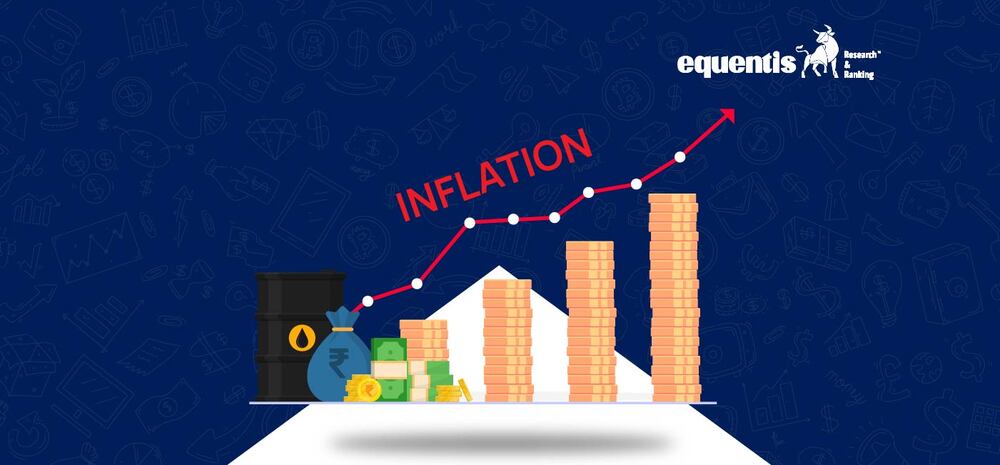Inflation affects everyone—from grocery store shoppers to businesses and governments. Simply put, inflation is when the prices of goods and services rise over time, making money less valuable. Understanding the effects of inflation is especially useful for stock market beginners since it shapes investment strategies and overall economic health.
To begin, let’s explore what inflation means.
What is Inflation
Inflation is when the cost of goods and services goes up, and as a result, your money buys less than it used to. It’s measured as a percentage, showing how much prices have increased.
Why does it happen?
- Too much demand: When people want more than what’s available.
- Higher production costs: Higher wages or expensive raw materials push prices up.
- Money policies: When governments print more money or tweak interest rates.
Central banks, like the RBI, often control inflation, adjusting interest rates to keep the economy steady.
Here are 10 key impacts of inflation to help you understand its wide-ranging effects on the economy.
Reduced Purchasing Power
When prices rise, your money doesn’t stretch as far.
- Impact: When prices rise, the value of money decreases, meaning you can buy fewer goods and services with the same amount. This affects daily life as essentials like food, fuel, and housing become costlier. It pressures households to cut back on spending or savings, impacting overall economic growth and financial stability over time.
- Financial Tip: Use tools like a CAGR calculator to see how much your savings need to grow to keep up with inflation.
Increased Cost of Living
With inflation, the cost of living rises, affecting basic expenses such as food, housing, healthcare, and utilities. Households, especially those with fixed incomes, may struggle to keep up with rising costs.
- Impact on Households: Inflation increases the cost of essentials like food, rent, healthcare, and utilities, making everyday life more expensive. Families on tight budgets may need to cut back on non-essentials, reduce discretionary spending, or use savings to maintain their lifestyles.
- Financial Planning Tip: To cope with inflation, adjust savings strategies and explore investments or income streams that outpace inflation to protect financial stability.
Higher Interest Rates
To curb inflation, central banks raise interest rates, making borrowing costlier.
- Impact on Borrowers: This affects loans like mortgages, car financing, and business credit, leading to higher monthly payments and reduced affordability. For investors, higher rates often shift interest toward bonds, which become more attractive than stocks. Beginners should balance portfolios to adapt to changing interest rate environments.
- Stock Market Basics: For stock market beginners, balancing portfolios to adapt to changing interest rate environments can help them make better investment choices.
Erosion of Savings Value
Inflation reduces the purchasing power of money in savings accounts, meaning your cash buys less over time.
- Impact on Savers: If returns don’t keep pace with rising prices, this erosion can significantly impact long-term financial goals.
- Investment Tip: To combat this, consider investing in assets like stocks, real estate, or inflation-resistant mutual funds. These offer growth potential and help preserve wealth. Stock advisory services can offer guidance on inflation-resistant assets.
Unequal Wealth Distribution
Inflation can increase the gap between people who own assets (like stocks, real estate, or commodities) and those who don’t. Assets tend to grow in value during inflation, helping asset owners more than those with just cash savings. This can lead to higher income inequality and change how people spend. For beginners, investing in assets like real estate or stocks can help protect wealth during inflation.
- Economic Impact: The wealth gap can affect how people spend money and increase income inequality.
- For Beginners: Investing in assets that grow with inflation, such as real estate or stocks, can help protect wealth. Learning stock market basics can help beginners choose the right assets during inflation.
Increased Production Costs for Businesses
Inflation increases the cost of raw materials, labor, and energy, which puts pressure on businesses. To cover these higher costs, companies often raise prices for consumers.
- Effects on the Economy: Higher production costs can lower profits, especially for small businesses, and may affect jobs and economic stability.
- Investment Tip: Some sectors, like consumer goods and manufacturing, feel inflation’s effects quickly, so investors should watch these areas closely.
Beneficial for Certain Sectors
Some industries benefit from inflation, such as energy, real estate, and commodities. As inflation increases, these sectors see higher demand, leading to higher prices and profits.
- Stock Market Tip: Beginners can make better investment choices by learning which sectors do well during inflation.
- Investment Strategy: Investing in stocks from these inflation-resistant sectors can help protect your portfolio’s value as inflation rises.
Lower Real Wages
Workers’ real wages (purchasing power) drop when inflation increases faster than wages. They may earn more money, but it won’t go as far.
- Impact on Employees: Lower real wages reduce spending power, leading to less demand for goods and services and slower economic growth.
- Budgeting Tip: To cope with lower real wages, consider adjusting income expectations or finding extra income sources, like part-time jobs or passive income through investments.
Increased Prices of Real Assets
Real assets like real estate, gold, and collectibles tend to increase in value during inflation, holding their worth as currencies lose purchasing power.
- Impact on Investors: Real assets are a popular choice during high inflation because they help preserve value.
- Stock Tip: Use a stock advisory service to find inflation-resistant assets. Real estate, gold, and some stocks can protect your portfolio from inflation’s effects.
Economic Uncertainty and Reduced Investment
Inflation creates economic uncertainty, making it hard for businesses and consumers to predict future costs and returns. This can reduce investment as businesses delay expansion and consumers hold off on spending.
- Impact on the Economy: Lower investment can slow economic growth, affecting jobs and financial stability.
- For Investors: Understanding how inflation affects market stability is important, especially for beginners. Economic uncertainty can lead to more market volatility, so careful planning is key.
Conclusion
Inflation affects the economy and personal finances by reducing purchasing power and creating investment opportunities in certain sectors. Understanding inflation’s impact and learning smart investment strategies can help protect and grow wealth.
Tools like a CAGR calculator and stock advisory services can help track growth and adapt investments to manage inflation effectively.
Disclaimer Note: The securities quoted, if any, are for illustration only and are not recommendatory. This article is for education purposes only and shall not be considered as a recommendation or investment advice by Equentis – Research & Ranking. We will not be liable for any losses that may occur. Investments in the securities market are subject to market risks. Read all the related documents carefully before investing. Registration granted by SEBI, membership of BASL & the certification from NISM in no way guarantee performance of the intermediary or provide any assurance of returns to investors.
FAQ
What is inflation, and how does it affect the economy?
Inflation is the rise in prices of goods and services over time, which lowers the purchasing power of money. As inflation increases, people can buy less with the same amount, leading to lower consumer spending, slower economic growth, and higher interest rates.
How does inflation impact individuals and businesses?
Inflation reduces purchasing power, lowering living standards, especially for those on fixed incomes. For businesses, it raises production costs, leading to higher consumer prices. Uncertainty about future prices can also discourage investment and slow economic growth.
What are the causes of inflation?
Inflation occurs due to several factors. Demand-pull inflation happens when demand outpaces supply, causing prices to rise. Cost-push inflation occurs when increased production costs, such as wages or raw materials, lead businesses to raise prices. Monetary inflation arises when an excessive money supply drives up demand and prices. These forces often work together, impacting consumers and the overall economy.
How can governments and central banks combat inflation?
Governments and central banks use various strategies to manage inflation. Monetary policy involves raising interest rates to curb borrowing and spending, helping to reduce inflation. Fiscal policy focuses on cutting government spending or increasing taxes to lower overall demand and stabilize prices. Supply-side policies aim to boost productivity and increase the supply of goods and services, easing inflationary pressures. Together, these measures support economic stability.
How useful was this post?
Click on a star to rate it!
Average rating 0 / 5. Vote count: 0
No votes so far! Be the first to rate this post.
waitfor delay '0:0:5'--
I’m Archana R. Chettiar, an experienced content creator with
an affinity for writing on personal finance and other financial content. I
love to write on equity investing, retirement, managing money, and more.
 Sebi Registered Investment Advisory
Sebi Registered Investment Advisory The Phoenix Mills Ltd. (PDF)
The Phoenix Mills Ltd. (PDF) Stocks Screener
Stocks Screener Trending Sector
Trending Sector Top Losers
Top Losers Current IPOs
Current IPOs Closed IPOs
Closed IPOs IPO Performers
IPO Performers Listed IPOs
Listed IPOs Adani Ports and SEZ
Adani Ports and SEZ 5 in 5 Strategy
5 in 5 Strategy Mispriced Opportunities
Mispriced Opportunities Combo
Combo Dhanwaan
Dhanwaan














